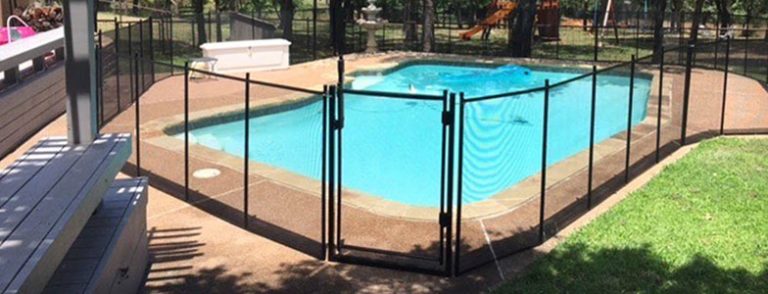
Get a free estimate today by contacting your certified pool safety fence dealer now.

Looking for a secure pool fence in Connecticut? We install strong, removable mesh barriers that meet the Connecticut pool fence code and all residential swimming pool regulations statewide. Whether you’re in the suburbs, along the coast, or anywhere in between, our fences are designed to keep kids safe, meet local inspection standards, and stand up to New England weather. We’ll help you navigate Connecticut pool regulations with fast installation and a clean, code-approved finish.
Navigating the Connecticut pool fence code can feel overwhelming—but we make it easy. Whether you’re installing a brand-new barrier or replacing an outdated one, our team ensures your fence meets every requirement under Connecticut residential swimming pool regulations.
Here’s why homeowners across the state trust us for professional pool fence installation:
Our experts conduct a free consultation, take precise measurements, and design a custom fence layout that meets safety standards. Once finalized, we prepare the surface, whether concrete, grass, pavers, or dirt to ensure a stable and secure installation in Connecticut.
For concrete surfaces, we use precision core drilling, while dirt or gravel areas are secured with aluminum sleeves and quick-set concrete for maximum durability. Our certified installers in Connecticut then align, secure, and assemble the panels, adjusting the tension for seamless integration and structural integrity.
We install stainless steel locking latches and self-closing gate mechanisms, ensuring secure access while preventing unauthorized entry. A final inspection is conducted to verify compliance, followed by a clean-up and a detailed maintenance walkthrough to ensure long-term durability.
When it comes to pool safety, only the best will do. Choose Pool Guard™ for unmatched security, durability, and style.
Don’t wait, secure your pool with Pool Guard™ today, and get:
In Connecticut, any residential pool with a water depth of 24 inches or more—including in-ground, above-ground, and inflatable pools—must be protected by a code-compliant barrier. These rules are outlined under the Connecticut State Building Code, which adopts the International Swimming Pool and Spa Code (ISPSC) with state-specific modifications.
Here are the general requirements for any pool fence in Connecticut:
Fairfield enforces the state building code but local zoning boards may impose stricter height or material standards—especially in HOA communities and historic districts. In coastal zones, salt-resistant materials are often recommended for durability.
Most towns follow state code closely. Hartford inspectors focus heavily on alarm compliance and gate mechanics. In urban neighborhoods, side-yard access points often require additional inspection.
This county mirrors state-level pool fencing rules but places strong emphasis on site plan submission with your permit. Temporary or seasonal fences must still meet all code requirements.
With many shoreline communities, New London recommends materials that withstand salt air and coastal weather. Automatic covers are popular in second homes here, but they must meet ASTM specs and be properly maintained.
Rural properties with natural boundaries still require full barriers unless the terrain physically prevents access. Inspectors focus on grade consistency and latch height on uneven ground.
Middlesex follows state rules but emphasizes pool alarms. If a cover is used in place of a fence, it must be ASTM-compliant and functional at the time of inspection.
Most towns in Tolland require a permit for the pool and barrier together. Inspectors commonly check for proper spacing between horizontal fence rails and ground clearance.
Windham’s local offices follow state minimums but often require photos or drawings for final approval. Barriers must be installed before the pool is filled.
Yes. If the pool holds more than 24 inches of water, it must have a barrier—even if it’s an above-ground or storable pool. If the pool wall is 48″ high and not climbable, it may count as the barrier, but the ladder must be lockable or removable when not in use.
Yes. Connecticut is one of the few states that requires both a physical barrier and a pool alarm. The alarm must sound when someone or something over 15 lbs enters the pool unexpectedly.
Yes, but only if the cover meets ASTM F1346 standards. Even then, some municipalities may still require partial fencing, especially if the pool is near a property line or shared space.
Yes. Many Connecticut HOAs, especially in newer developments, require specific fence styles or colors that align with neighborhood design rules. We install fences that meet Connecticut pool regulations and satisfy HOA guidelines.
Most projects are completed in a single day. Our team handles layout, permitting support, and quick installation so your fence is inspection-ready without delays.
We install pool fences across the state—including Fairfield County, Hartford, New Haven, and beyond. Whether you’re in a city, shoreline town, or rural area, we’ve got your property covered.
Yes. Our mesh pool fences meet code for height, spacing, and climb resistance, and are approved in municipalities across Connecticut, including New Haven, Norwalk, and Danbury.
Failure to comply with Connecticut pool fence regulations can result in fines, failed inspections, or denial of occupancy permits for new construction. It also increases liability if an accident occurs.
Pool Guard USA is a US-based pool safety equipment manufacturer specializing in pool fences, pool covers, pool safety nets along with installation services throughout the United States.
Please fill out the form below with your information. Your local dealer will be notified about your inquiry.
Stay up to date on everything about Pool Guard USA.
Please fill out the form below with your information. Your local dealer will be notified about your inquiry.